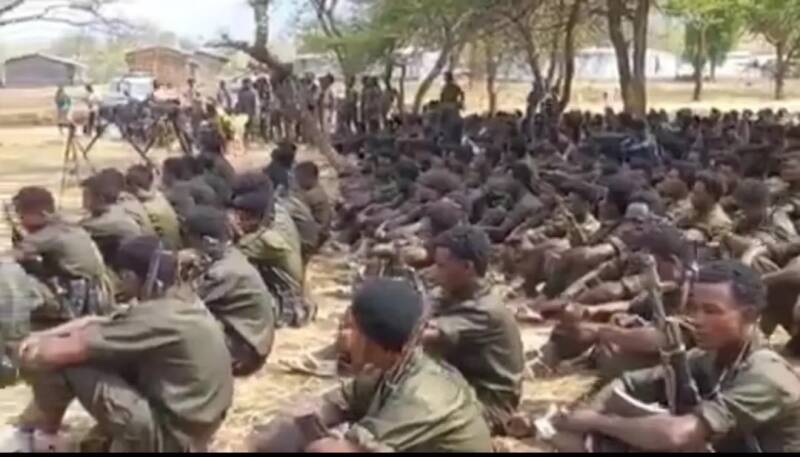War is coming! Ethiopian civil war threatens coffee and other industries
Recently, the Chinese Consulate in Ethiopia issued another notice that the security situation in Ethiopia is still grim, reminding citizens and institutions already in Ethiopia and planning to travel to Ethiopia to know the local travel risk level and security warning.
At present, Ethiopia is divided into six red (very high-risk) regions, three orange (high-risk) areas, and the rest are yellow (medium-risk) areas.
Among them, the red high-risk areas include the whole of Tiger and Amhara, north of A4 and west of A3 in Oromia, and four areas of the state, as well as the border between multiple states.
The orange high-risk areas include Benny Hills Gul-Gumuz, Gambera, and Afar except the border. The rest of the country are yellow and medium-risk areas.
It is understood that in order to prevent local armed conflicts and decide to build a strong federal army, the Ethiopian federal government will integrate local armed forces from 11 states into the federal forces.
But the move was protested by nationalists in Amhara, arguing that the Ethiopian government was weakening Amhara's power and undermining the state's regional security, so there were clashes between the state's Farno forces and the federal government in August 2023, which continue to this day.
According to local media reports, the Ethiopian government is deploying as many as 90000 new soldiers to the Amhara region. Sources say that the Ethiopian government plans to carry out extensive military operations in the region in the next 10 days and destroy the Farno forces in the area within two weeks.

Although, according to the Ethiopian Coffee and Tea Authority (ECTA), in the first nine months of the fiscal year (beginning in July 2023), Ethiopian coffee exports reached 174000 tons, with export revenues totaling US $835.2 million, a record high for the same period.
But the civil war that followed will seriously affect the country's economy. It is understood that there are many coffee-producing areas in the red and orange high-risk areas currently delineated. Once the civil war breaks out, it may cause losses to the country's infrastructure, production capacity, and supply chain, restricting production and business activities, including coffee, tourism and other industries.

In addition, Ethiopia is a landlocked country, exports and imports are dependent on ports in neighbouring Djibouti, but the route to the port is a high-risk area, and some areas will block routes because of the upcoming war.
This will seriously affect the country's transportation industry, and the reduction in imports and exports will greatly affect the country's economy, such as inflation and recession.
In addition, Ethiopia officially confirmed that the Zhuoyou Cup Cup of Excellen will be held in July this year. At present, more than 600 samples have arrived at the regional warehouse waiting for review.
In 2023, Ethiopia did not hold the COE because of the civil war. If the civil war does not end within two weeks, it may lead to the cancellation or termination of this year's COE competition.
Coupled with the fact that the whole of Ethiopia is now in dangerous areas above medium risk, this has greatly prevented many coffee traders and bean hunters from going to the country, hindering the development of the country's coffee industry.
Important Notice :
前街咖啡 FrontStreet Coffee has moved to new addredd:
FrontStreet Coffee Address: 315,Donghua East Road,GuangZhou
Tel:020 38364473
- Prev

The right way and technique for making coffee: What if the coffee is too bad?
For any coffee lover, no matter what their respective preferences are, the goal of learning to make coffee is the same: it tastes good. We carefully select equipment and beans, pay attention to parameters, and pursue techniques... Which one is not to make the coffee in our hands more delicious, right? But compared to professional
- Next

Introduction of varieties grown in the coffee producing areas of the Philippines, an Asian coffee-producing country
When it comes to Asian coffee, many people will think of Indonesia, Vietnam and other countries. After all, Indonesia has the well-known Mantelin coffee, and Vietnam is famous for being the second largest coffee producer in the world. Therefore, many people ignore the Philippines as a coffee producer. country. Philippines Republic of the Philippines (
Related
- What grade does Jamaica Blue Mountain No. 1 coffee belong to and how to drink it better? What is the highest grade of Blue Mountain coffee for coffee aristocrats?
- What are the flavor characteristics of the world-famous coffee Blue Mountain No. 1 Golden Mantelin? What are the characteristics of deep-roasted bitter coffee?
- Can I make coffee a second time in an Italian hand-brewed mocha pot? Why can't coffee be brewed several times like tea leaves?
- Hand-brewed coffee flows with a knife and a tornado. How to brew it? What is the proportion of grinding water and water temperature divided into?
- What is the difference between Indonesian Sumatra Mantinin coffee and gold Mantinin? How to distinguish between real and fake golden Mantelin coffee?
- What does bypass mean in coffee? Why can hand-brewed coffee and water make it better?
- Unexpected! Ruixing Telunsu lattes use a smoothie machine to foam milk?!
- % Arabia's first store in Henan opens into the village?! Netizen: Thought it was P's
- Does an authentic standard mocha coffee recipe use chocolate sauce or powder? Mocha Latte/Dirty Coffee/Salty Mocha Coffee Recipe Share!
- What is the difference between Vietnam egg coffee and Norway egg coffee? Hand-brewed single product coffee filter paper filter cloth filter flat solution!

